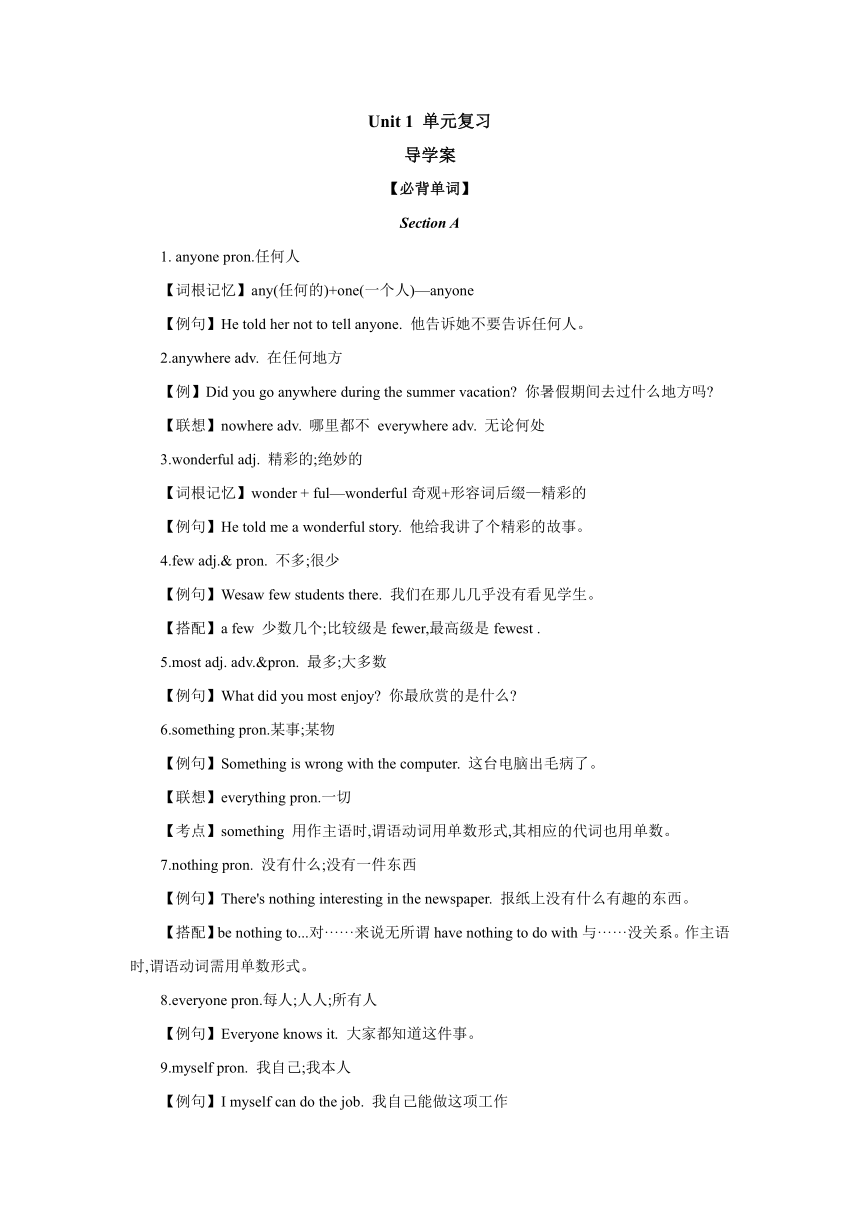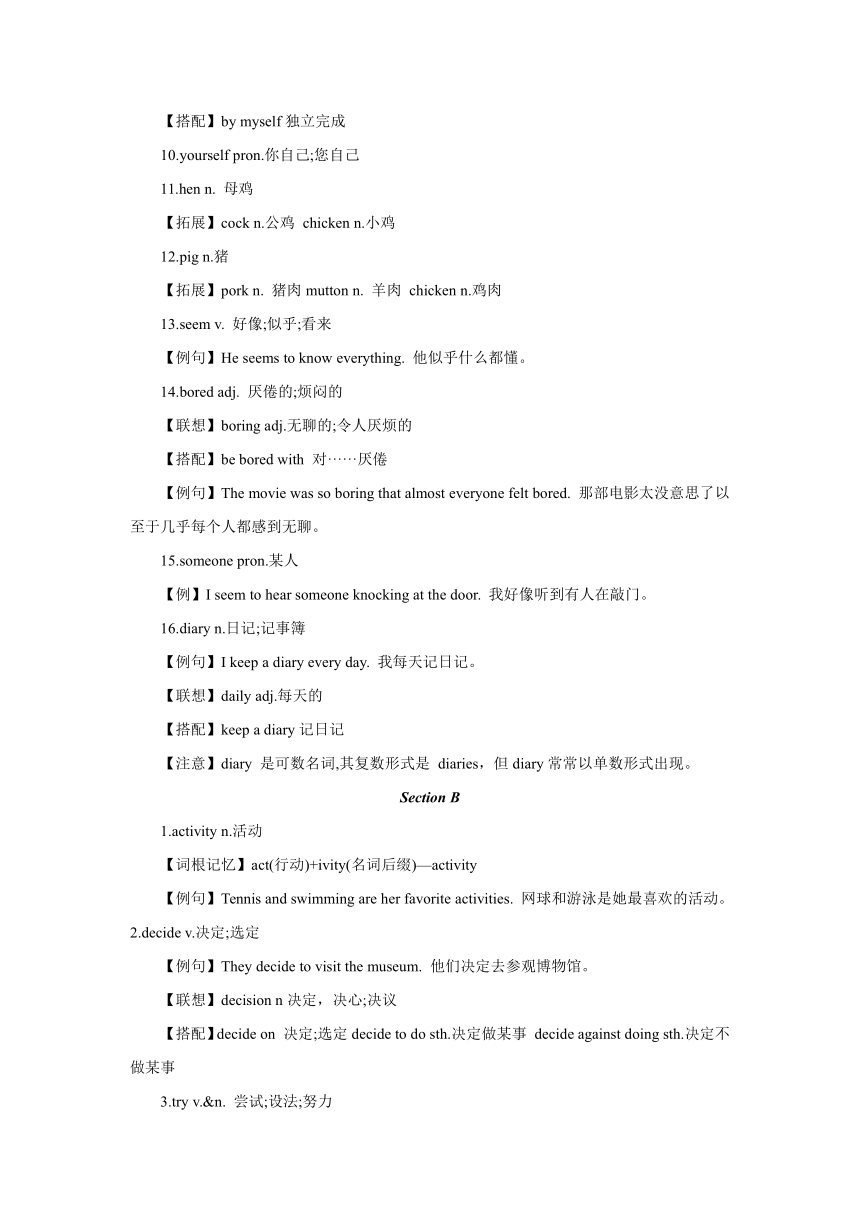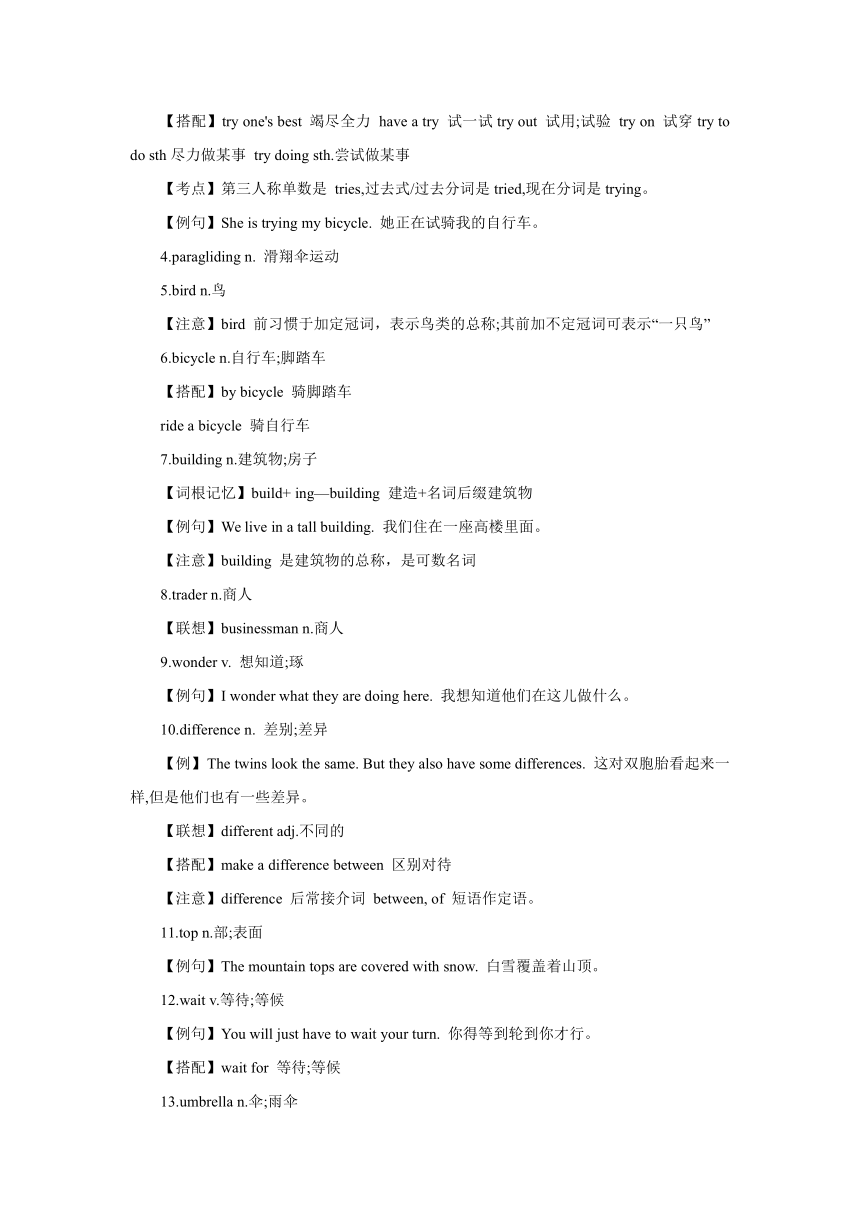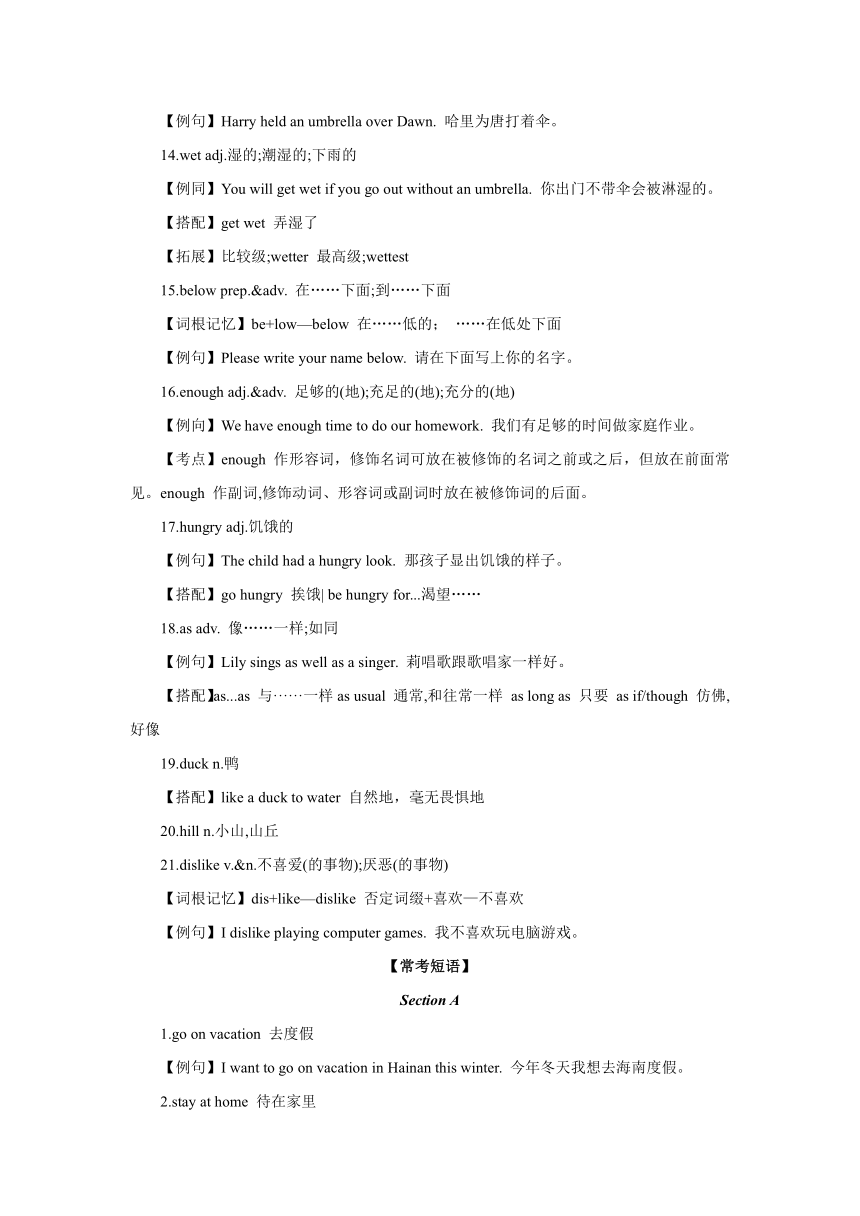人教版八年级上册Unit 1Where did you go on vacation? 单元复习 导学案
文档属性
| 名称 | 人教版八年级上册Unit 1Where did you go on vacation? 单元复习 导学案 |  | |
| 格式 | docx | ||
| 文件大小 | 24.3KB | ||
| 资源类型 | 教案 | ||
| 版本资源 | 人教新目标(Go for it)版 | ||
| 科目 | 英语 | ||
| 更新时间 | 2022-12-07 15:50:48 | ||
图片预览




文档简介
Unit 1 单元复习
导学案
【必背单词】
Section A
1. anyone pron.任何人
【词根记忆】any(任何的)+one(一个人)—anyone
【例句】He told her not to tell anyone. 他告诉她不要告诉任何人。
2.anywhere adv. 在任何地方
【例】Did you go anywhere during the summer vacation 你暑假期间去过什么地方吗
【联想】nowhere adv. 哪里都不 everywhere adv. 无论何处
3.wonderful adj. 精彩的;绝妙的
【词根记忆】wonder + ful—wonderful奇观+形容词后缀—精彩的
【例句】He told me a wonderful story. 他给我讲了个精彩的故事。
4.few adj.& pron. 不多;很少
【例句】Wesaw few students there. 我们在那儿几乎没有看见学生。
【搭配】a few 少数几个;比较级是fewer,最高级是fewest .
5.most adj. adv.&pron. 最多;大多数
【例句】What did you most enjoy 你最欣赏的是什么
6.something pron.某事;某物
【例句】Something is wrong with the computer. 这台电脑出毛病了。
【联想】everything pron.一切
【考点】something 用作主语时,谓语动词用单数形式,其相应的代词也用单数。
7.nothing pron. 没有什么;没有一件东西
【例句】There's nothing interesting in the newspaper. 报纸上没有什么有趣的东西。
【搭配】be nothing to...对······来说无所谓have nothing to do with与······没关系。作主语时,谓语动词需用单数形式。
8.everyone pron.每人;人人;所有人
【例句】Everyone knows it. 大家都知道这件事。
9.myself pron. 我自己;我本人
【例句】I myself can do the job. 我自己能做这项工作
【搭配】by myself独立完成
10.yourself pron.你自己;您自己
11.hen n. 母鸡
【拓展】cock n.公鸡 chicken n.小鸡
12.pig n.猪
【拓展】pork n. 猪肉mutton n. 羊肉 chicken n.鸡肉
13.seem v. 好像;似乎;看来
【例句】He seems to know everything. 他似乎什么都懂。
14.bored adj. 厌倦的;烦闷的
【联想】boring adj.无聊的;令人厌烦的
【搭配】be bored with 对······厌倦
【例句】The movie was so boring that almost everyone felt bored. 那部电影太没意思了以至于几乎每个人都感到无聊。
15.someone pron.某人
【例】I seem to hear someone knocking at the door. 我好像听到有人在敲门。
16.diary n.日记;记事簿
【例句】I keep a diary every day. 我每天记日记。
【联想】daily adj.每天的
【搭配】keep a diary记日记
【注意】diary 是可数名词,其复数形式是 diaries,但diary常常以单数形式出现。
Section B
1.activity n.活动
【词根记忆】act(行动)+ivity(名词后缀)—activity
【例句】Tennis and swimming are her favorite activities. 网球和游泳是她最喜欢的活动。2.decide v.决定;选定
【例句】They decide to visit the museum. 他们决定去参观博物馆。
【联想】decision n决定,决心;决议
【搭配】decide on 决定;选定decide to do sth.决定做某事 decide against doing sth.决定不做某事
3.try v.&n. 尝试;设法;努力
【搭配】try one's best 竭尽全力 have a try 试一试try out 试用;试验 try on 试穿try to do sth尽力做某事 try doing sth.尝试做某事
【考点】第三人称单数是 tries,过去式/过去分词是tried,现在分词是trying。
【例句】She is trying my bicycle. 她正在试骑我的自行车。
4.paragliding n. 滑翔伞运动
5.bird n.鸟
【注意】bird 前习惯于加定冠词,表示鸟类的总称;其前加不定冠词可表示“一只鸟”
6.bicycle n.自行车;脚踏车
【搭配】by bicycle 骑脚踏车
ride a bicycle 骑自行车
7.building n.建筑物;房子
【词根记忆】build+ ing—building 建造+名词后缀建筑物
【例句】We live in a tall building. 我们住在一座高楼里面。
【注意】building 是建筑物的总称,是可数名词
8.trader n.商人
【联想】businessman n.商人
9.wonder v. 想知道;琢
【例句】I wonder what they are doing here. 我想知道他们在这儿做什么。
10.difference n. 差别;差异
【例】 The twins look the same. But they also have some differences. 这对双胞胎看起来一样,但是他们也有一些差异。
【联想】different adj.不同的
【搭配】make a difference between 区别对待
【注意】difference 后常接介词 between, of 短语作定语。
11.top n.部;表面
【例句】The mountain tops are covered with snow. 白雪覆盖着山顶。
12.wait v.等待;等候
【例句】You will just have to wait your turn. 你得等到轮到你才行。
【搭配】wait for 等待;等候
13.umbrella n.伞;雨伞
【例句】Harry held an umbrella over Dawn. 哈里为唐打着伞。
14.wet adj.湿的;潮湿的;下雨的
【例同】You will get wet if you go out without an umbrella. 你出门不带伞会被淋湿的。
【搭配】get wet 弄湿了
【拓展】比较级;wetter 最高级;wettest
15.below prep.&adv. 在……下面;到……下面
【词根记忆】be+low—below 在……低的; ……在低处下面
【例句】Please write your name below. 请在下面写上你的名字。
16.enough adj.&adv. 足够的(地);充足的(地);充分的(地)
【例向】We have enough time to do our homework. 我们有足够的时间做家庭作业。
【考点】enough 作形容词,修饰名词可放在被修饰的名词之前或之后,但放在前面常见。enough 作副词,修饰动词、形容词或副词时放在被修饰词的后面。
17.hungry adj.饥饿的
【例句】The child had a hungry look. 那孩子显出饥饿的样子。
【搭配】go hungry 挨饿| be hungry for...渴望……
18.as adv. 像……一样;如同
【例句】Lily sings as well as a singer. 莉唱歌跟歌唱家一样好。
【搭配】as...as 与······一样as usual 通常,和往常一样 as long as 只要 as if/though 仿佛,好像
19.duck n.鸭
【搭配】like a duck to water 自然地,毫无畏惧地
20.hill n.小山,山丘
21.dislike v.&n.不喜爱(的事物);厌恶(的事物)
【词根记忆】dis+like—dislike 否定词缀+喜欢—不喜欢
【例句】I dislike playing computer games. 我不喜欢玩电脑游戏。
【常考短语】
Section A
1.go on vacation 去度假
【例句】I want to go on vacation in Hainan this winter. 今年冬天我想去海南度假。
2.stay at home 待在家里
3.go to the mountains 去山区
4.go to the beach 去海滩
5.visit a museum 参观博物馆
6.gotosummer camp 去参加夏令营
7.quite a few 相当多;不少
【例句】There are quite a few people in the restaurant. 餐馆里有很多人。
8.study for... 为······而学习
9.go out 出去
10.most of the time 大部分时间
【例句】It's noisy here most of the time.这儿大部分时间都很吵。
11.taste good 尝起来很好吃
12.havea good time 玩得高兴;过得愉快
【例句】We had a good time at the party.我们在聚会上玩得很开心。
13.of course 当然;自然
【例句】—May I borrow your dictionary 我可以借你的词典吗
—Of course! 当然了!
14. keep a diary 记日记
15.go shopping 去买东西
【例句】I usually go shopping on Sundays. 我通常星期天去购物。
16.take photos 照相
【例句】We took many photos on the Great Wall. 我们在长城上拍了很多照片。
17.anything special 任何特殊的事情
18.in the countryside 在农村
Section B
1.in the past 在过去
2.walk around四处走走
3.too many太多
4.because of 因为
【例句】He can't take a walk because of the rain. 因为下雨他不能散步。
5.one bowl of... 一碗……
6.the next day 第二天
7.drink tea 喝茶
8.find out 找出;查明
9.go on 继续
【例句】We have to go on although the task is quite difficult. 尽管任务很艰巨,我们不得不继续下去。
10.feel like 给······的感觉;感受到
【例句】Lucy feels like she is in a very nice dream. 露西感觉像在美梦里一样。
11.something important 重要的事
12. up and down 上上下下
【例句】They looked me up and down. 他们上上下下打量我。
e up 升起
【例句】It gets hot after the sun has come up. 太阳升起来后,天就变热了。
14.have fun 过得愉快
15.arrive in 到达
16.go...with...和……一起去
17.walk up 走上去
18.so...that,... 如此……以至于……
【重点句型】
Section A
1.Where did you go on vacation 你去哪里了 本句为 Where did... 句型,这个句型是一般过去时的特殊疑问句,询问地点。did 是助动词,注意后面的实义动词要用原形。
【例句】Where did you go shopping 你去哪里购物了
2.Still no one seemed to be bored. 虽然如此,好像没有人厌烦。
seem(+to be)十名词或形容词”意为“看起来······好像……”,说明主语的特征或状态,to be 可省略。其中seem 用作连系动词,意为“好像;似乎;看起来”。
【例句】Tom seems to be a very clever boy. 汤姆看上去是一个非常聪明的男孩。
【拓展】seem的其他用法:
seem to do sth, “好像/似乎做某事”
【例句】Tom seems to know everything. 汤姆好像什么都知道。
It seems/seemed that, … “看起来好像……似乎……
【例句】It seems that she is thinking.她好像在思考什么
It seems as if...“看起来像/仿佛……”
【例句】It seems as if it is going to rain. 看起来天快要下雨了。
Section B
1. What a difference a day makes! 天的差异是多么大!
本句是 what 引导的感叹句,结构为:What+名词(词组)+主语+谓语!此式所强调的成分是what 后面的名词(词组)。
【例句】What fun today is! 今天多开心呀!
What a cute dog it is! 多么可爱的狗呀!
【注意】此句式中名词为可数名词单数时,名词前须有不定冠词 a/an。
【拓展】感叹句是表达喜、怒、哀、乐以及惊奇、惊讶等强烈感情的句子,感叹句主要有以下几种结构:
What+a/an+形容词+可数名词单数+主语+谓语!
【例句】What an interesting book it is! 多么有趣的一本书啊!
What+形容词+复数名词/不可数名词+主语+谓语!
【例句】What fine weather it is today! 今天天气多好啊!
What beautiful flowers they are! 多么漂亮的花啊!
how引导的感叹句结构为:How+形容词/副词+主语+谓语!
【例句】How beautiful she is! 她是多么漂亮啊!
How well he plays the piano! 他钢琴弹得多么好啊!
【语法总结】
一、复合不定代词
1.构成:由some—; any—, every, no—加上—one,—body,—thing 构成的不定代词称为复合不定代词。具体如下表:
one body thing
some someone somebody something
any anyone anybody anything
every everyone everybody everything
no no one nobody nothing
2.用法:
(1)复合不定代词相当于名词,在句中可以作主语、宾语和表语,但不能作定语.
There is someone outside the door. 门外有人。(主语)
I don't have anything to say today. 我今天没什么可说的。(宾语)
Is there anyone in the room 房间里有人吗 (表语)
(2)复合不定代词被形容词,动词不定式等修饰时,形容词和动词不定式等应置于其后。
I have something important to tell you. 我有重要的事情要告诉你。
Do you want anything to drink 你想喝点什么吗
(3)复合不定代词表示单数概念,作主语时,谓语动词用单数形式。
Everything begins to grow in spring. 春天万物开始生长。
Someone is waiting for you at the door. 有人在门口等你。
(4)some—不定代词,通常用于肯定句中;any—不定代词则多用于否定句、疑问句中。但在表示请求、建议、反问等的疑问句中,问话者希望得到肯定答复时,常用含有 some—的不定代词,如 something; somebody, someone 等。
Would you like something to eat 你想要些吃的东西吗
I can do anything for you. 我能为你做任何事。
二、一般过去时的规则动词与不规则动词英语中的动词按其过去式的构成方式可分为规则动词和不规则动词。规则动词的过去式由词尾加—ed 构成,而不规则动词的变化因词而异。
1.规则动词过去式的构成和发音:
一般的动词 直接加-ed watch-watched help-helped work-worked 读音规则:清辅音后读/t/; 浊辅音和元音后读/d/;辅音/t/与/d/后读/id/
以字母e结尾的规则动词 只加-d love-loved live-lived arrive-arrived
以辅音字母加y结尾的动词 变y为i, 再加-ed study-studied worry-worried
重度闭音节结尾的动词,末尾只有一个辅音字母 先双写这个字母,再加-ed shop-shopped stop-stopped
2.不规则动词的过去式的变化各异,需要特殊记忆,每个不规则动词的变换形式都必须牢记。不规则动词的过去式变化没有统一的规则,但并非一点规律也没有,下面我们就介绍一部分动词过去式的记忆规律。
(1)动词的过去式与动词原形一样。
let——let put—put read—read cut—cut
(2)遇见i改为 a。
swim—swam sing—sang begin—began drink—drank sit—sat give—gave
1—Have you read today's newspaper
—Yes, but there isn't ________.
A. new something B. something new C. new anything D. anything new
2 A smile costs _______but gives so much.
A. something B. anything C. nothing D. everything
3 Tony ______football every weekend when he was young.
A. plays B. played C. is playing D. has played
导学案
【必背单词】
Section A
1. anyone pron.任何人
【词根记忆】any(任何的)+one(一个人)—anyone
【例句】He told her not to tell anyone. 他告诉她不要告诉任何人。
2.anywhere adv. 在任何地方
【例】Did you go anywhere during the summer vacation 你暑假期间去过什么地方吗
【联想】nowhere adv. 哪里都不 everywhere adv. 无论何处
3.wonderful adj. 精彩的;绝妙的
【词根记忆】wonder + ful—wonderful奇观+形容词后缀—精彩的
【例句】He told me a wonderful story. 他给我讲了个精彩的故事。
4.few adj.& pron. 不多;很少
【例句】Wesaw few students there. 我们在那儿几乎没有看见学生。
【搭配】a few 少数几个;比较级是fewer,最高级是fewest .
5.most adj. adv.&pron. 最多;大多数
【例句】What did you most enjoy 你最欣赏的是什么
6.something pron.某事;某物
【例句】Something is wrong with the computer. 这台电脑出毛病了。
【联想】everything pron.一切
【考点】something 用作主语时,谓语动词用单数形式,其相应的代词也用单数。
7.nothing pron. 没有什么;没有一件东西
【例句】There's nothing interesting in the newspaper. 报纸上没有什么有趣的东西。
【搭配】be nothing to...对······来说无所谓have nothing to do with与······没关系。作主语时,谓语动词需用单数形式。
8.everyone pron.每人;人人;所有人
【例句】Everyone knows it. 大家都知道这件事。
9.myself pron. 我自己;我本人
【例句】I myself can do the job. 我自己能做这项工作
【搭配】by myself独立完成
10.yourself pron.你自己;您自己
11.hen n. 母鸡
【拓展】cock n.公鸡 chicken n.小鸡
12.pig n.猪
【拓展】pork n. 猪肉mutton n. 羊肉 chicken n.鸡肉
13.seem v. 好像;似乎;看来
【例句】He seems to know everything. 他似乎什么都懂。
14.bored adj. 厌倦的;烦闷的
【联想】boring adj.无聊的;令人厌烦的
【搭配】be bored with 对······厌倦
【例句】The movie was so boring that almost everyone felt bored. 那部电影太没意思了以至于几乎每个人都感到无聊。
15.someone pron.某人
【例】I seem to hear someone knocking at the door. 我好像听到有人在敲门。
16.diary n.日记;记事簿
【例句】I keep a diary every day. 我每天记日记。
【联想】daily adj.每天的
【搭配】keep a diary记日记
【注意】diary 是可数名词,其复数形式是 diaries,但diary常常以单数形式出现。
Section B
1.activity n.活动
【词根记忆】act(行动)+ivity(名词后缀)—activity
【例句】Tennis and swimming are her favorite activities. 网球和游泳是她最喜欢的活动。2.decide v.决定;选定
【例句】They decide to visit the museum. 他们决定去参观博物馆。
【联想】decision n决定,决心;决议
【搭配】decide on 决定;选定decide to do sth.决定做某事 decide against doing sth.决定不做某事
3.try v.&n. 尝试;设法;努力
【搭配】try one's best 竭尽全力 have a try 试一试try out 试用;试验 try on 试穿try to do sth尽力做某事 try doing sth.尝试做某事
【考点】第三人称单数是 tries,过去式/过去分词是tried,现在分词是trying。
【例句】She is trying my bicycle. 她正在试骑我的自行车。
4.paragliding n. 滑翔伞运动
5.bird n.鸟
【注意】bird 前习惯于加定冠词,表示鸟类的总称;其前加不定冠词可表示“一只鸟”
6.bicycle n.自行车;脚踏车
【搭配】by bicycle 骑脚踏车
ride a bicycle 骑自行车
7.building n.建筑物;房子
【词根记忆】build+ ing—building 建造+名词后缀建筑物
【例句】We live in a tall building. 我们住在一座高楼里面。
【注意】building 是建筑物的总称,是可数名词
8.trader n.商人
【联想】businessman n.商人
9.wonder v. 想知道;琢
【例句】I wonder what they are doing here. 我想知道他们在这儿做什么。
10.difference n. 差别;差异
【例】 The twins look the same. But they also have some differences. 这对双胞胎看起来一样,但是他们也有一些差异。
【联想】different adj.不同的
【搭配】make a difference between 区别对待
【注意】difference 后常接介词 between, of 短语作定语。
11.top n.部;表面
【例句】The mountain tops are covered with snow. 白雪覆盖着山顶。
12.wait v.等待;等候
【例句】You will just have to wait your turn. 你得等到轮到你才行。
【搭配】wait for 等待;等候
13.umbrella n.伞;雨伞
【例句】Harry held an umbrella over Dawn. 哈里为唐打着伞。
14.wet adj.湿的;潮湿的;下雨的
【例同】You will get wet if you go out without an umbrella. 你出门不带伞会被淋湿的。
【搭配】get wet 弄湿了
【拓展】比较级;wetter 最高级;wettest
15.below prep.&adv. 在……下面;到……下面
【词根记忆】be+low—below 在……低的; ……在低处下面
【例句】Please write your name below. 请在下面写上你的名字。
16.enough adj.&adv. 足够的(地);充足的(地);充分的(地)
【例向】We have enough time to do our homework. 我们有足够的时间做家庭作业。
【考点】enough 作形容词,修饰名词可放在被修饰的名词之前或之后,但放在前面常见。enough 作副词,修饰动词、形容词或副词时放在被修饰词的后面。
17.hungry adj.饥饿的
【例句】The child had a hungry look. 那孩子显出饥饿的样子。
【搭配】go hungry 挨饿| be hungry for...渴望……
18.as adv. 像……一样;如同
【例句】Lily sings as well as a singer. 莉唱歌跟歌唱家一样好。
【搭配】as...as 与······一样as usual 通常,和往常一样 as long as 只要 as if/though 仿佛,好像
19.duck n.鸭
【搭配】like a duck to water 自然地,毫无畏惧地
20.hill n.小山,山丘
21.dislike v.&n.不喜爱(的事物);厌恶(的事物)
【词根记忆】dis+like—dislike 否定词缀+喜欢—不喜欢
【例句】I dislike playing computer games. 我不喜欢玩电脑游戏。
【常考短语】
Section A
1.go on vacation 去度假
【例句】I want to go on vacation in Hainan this winter. 今年冬天我想去海南度假。
2.stay at home 待在家里
3.go to the mountains 去山区
4.go to the beach 去海滩
5.visit a museum 参观博物馆
6.gotosummer camp 去参加夏令营
7.quite a few 相当多;不少
【例句】There are quite a few people in the restaurant. 餐馆里有很多人。
8.study for... 为······而学习
9.go out 出去
10.most of the time 大部分时间
【例句】It's noisy here most of the time.这儿大部分时间都很吵。
11.taste good 尝起来很好吃
12.havea good time 玩得高兴;过得愉快
【例句】We had a good time at the party.我们在聚会上玩得很开心。
13.of course 当然;自然
【例句】—May I borrow your dictionary 我可以借你的词典吗
—Of course! 当然了!
14. keep a diary 记日记
15.go shopping 去买东西
【例句】I usually go shopping on Sundays. 我通常星期天去购物。
16.take photos 照相
【例句】We took many photos on the Great Wall. 我们在长城上拍了很多照片。
17.anything special 任何特殊的事情
18.in the countryside 在农村
Section B
1.in the past 在过去
2.walk around四处走走
3.too many太多
4.because of 因为
【例句】He can't take a walk because of the rain. 因为下雨他不能散步。
5.one bowl of... 一碗……
6.the next day 第二天
7.drink tea 喝茶
8.find out 找出;查明
9.go on 继续
【例句】We have to go on although the task is quite difficult. 尽管任务很艰巨,我们不得不继续下去。
10.feel like 给······的感觉;感受到
【例句】Lucy feels like she is in a very nice dream. 露西感觉像在美梦里一样。
11.something important 重要的事
12. up and down 上上下下
【例句】They looked me up and down. 他们上上下下打量我。
e up 升起
【例句】It gets hot after the sun has come up. 太阳升起来后,天就变热了。
14.have fun 过得愉快
15.arrive in 到达
16.go...with...和……一起去
17.walk up 走上去
18.so...that,... 如此……以至于……
【重点句型】
Section A
1.Where did you go on vacation 你去哪里了 本句为 Where did... 句型,这个句型是一般过去时的特殊疑问句,询问地点。did 是助动词,注意后面的实义动词要用原形。
【例句】Where did you go shopping 你去哪里购物了
2.Still no one seemed to be bored. 虽然如此,好像没有人厌烦。
seem(+to be)十名词或形容词”意为“看起来······好像……”,说明主语的特征或状态,to be 可省略。其中seem 用作连系动词,意为“好像;似乎;看起来”。
【例句】Tom seems to be a very clever boy. 汤姆看上去是一个非常聪明的男孩。
【拓展】seem的其他用法:
seem to do sth, “好像/似乎做某事”
【例句】Tom seems to know everything. 汤姆好像什么都知道。
It seems/seemed that, … “看起来好像……似乎……
【例句】It seems that she is thinking.她好像在思考什么
It seems as if...“看起来像/仿佛……”
【例句】It seems as if it is going to rain. 看起来天快要下雨了。
Section B
1. What a difference a day makes! 天的差异是多么大!
本句是 what 引导的感叹句,结构为:What+名词(词组)+主语+谓语!此式所强调的成分是what 后面的名词(词组)。
【例句】What fun today is! 今天多开心呀!
What a cute dog it is! 多么可爱的狗呀!
【注意】此句式中名词为可数名词单数时,名词前须有不定冠词 a/an。
【拓展】感叹句是表达喜、怒、哀、乐以及惊奇、惊讶等强烈感情的句子,感叹句主要有以下几种结构:
What+a/an+形容词+可数名词单数+主语+谓语!
【例句】What an interesting book it is! 多么有趣的一本书啊!
What+形容词+复数名词/不可数名词+主语+谓语!
【例句】What fine weather it is today! 今天天气多好啊!
What beautiful flowers they are! 多么漂亮的花啊!
how引导的感叹句结构为:How+形容词/副词+主语+谓语!
【例句】How beautiful she is! 她是多么漂亮啊!
How well he plays the piano! 他钢琴弹得多么好啊!
【语法总结】
一、复合不定代词
1.构成:由some—; any—, every, no—加上—one,—body,—thing 构成的不定代词称为复合不定代词。具体如下表:
one body thing
some someone somebody something
any anyone anybody anything
every everyone everybody everything
no no one nobody nothing
2.用法:
(1)复合不定代词相当于名词,在句中可以作主语、宾语和表语,但不能作定语.
There is someone outside the door. 门外有人。(主语)
I don't have anything to say today. 我今天没什么可说的。(宾语)
Is there anyone in the room 房间里有人吗 (表语)
(2)复合不定代词被形容词,动词不定式等修饰时,形容词和动词不定式等应置于其后。
I have something important to tell you. 我有重要的事情要告诉你。
Do you want anything to drink 你想喝点什么吗
(3)复合不定代词表示单数概念,作主语时,谓语动词用单数形式。
Everything begins to grow in spring. 春天万物开始生长。
Someone is waiting for you at the door. 有人在门口等你。
(4)some—不定代词,通常用于肯定句中;any—不定代词则多用于否定句、疑问句中。但在表示请求、建议、反问等的疑问句中,问话者希望得到肯定答复时,常用含有 some—的不定代词,如 something; somebody, someone 等。
Would you like something to eat 你想要些吃的东西吗
I can do anything for you. 我能为你做任何事。
二、一般过去时的规则动词与不规则动词英语中的动词按其过去式的构成方式可分为规则动词和不规则动词。规则动词的过去式由词尾加—ed 构成,而不规则动词的变化因词而异。
1.规则动词过去式的构成和发音:
一般的动词 直接加-ed watch-watched help-helped work-worked 读音规则:清辅音后读/t/; 浊辅音和元音后读/d/;辅音/t/与/d/后读/id/
以字母e结尾的规则动词 只加-d love-loved live-lived arrive-arrived
以辅音字母加y结尾的动词 变y为i, 再加-ed study-studied worry-worried
重度闭音节结尾的动词,末尾只有一个辅音字母 先双写这个字母,再加-ed shop-shopped stop-stopped
2.不规则动词的过去式的变化各异,需要特殊记忆,每个不规则动词的变换形式都必须牢记。不规则动词的过去式变化没有统一的规则,但并非一点规律也没有,下面我们就介绍一部分动词过去式的记忆规律。
(1)动词的过去式与动词原形一样。
let——let put—put read—read cut—cut
(2)遇见i改为 a。
swim—swam sing—sang begin—began drink—drank sit—sat give—gave
1—Have you read today's newspaper
—Yes, but there isn't ________.
A. new something B. something new C. new anything D. anything new
2 A smile costs _______but gives so much.
A. something B. anything C. nothing D. everything
3 Tony ______football every weekend when he was young.
A. plays B. played C. is playing D. has played
同课章节目录
- Unit 1 Where did you go on vacation?
- Section A
- Section B
- Unit 2 How often do you exercise?
- Section A
- Section B
- Unit 3 I'm more outgoing than my sister.
- Section A
- Section B
- Unit 4 What's the best movie theater?
- Section A
- Section B
- Unit 5 Do you want to watch a game show?
- Section A
- Section B
- Unit 6 I'm going to study computer science.
- Section A
- Section B
- Unit 7 Will people have robots?
- Section A
- Section B
- Unit 8 How do you make a banana milk shake?
- Section A
- Section B
- Unit 9 Can you come to my party?
- Section A
- Section B
- Unit 10 If you go to the party, you'll have a grea
- Section A
- Section B
